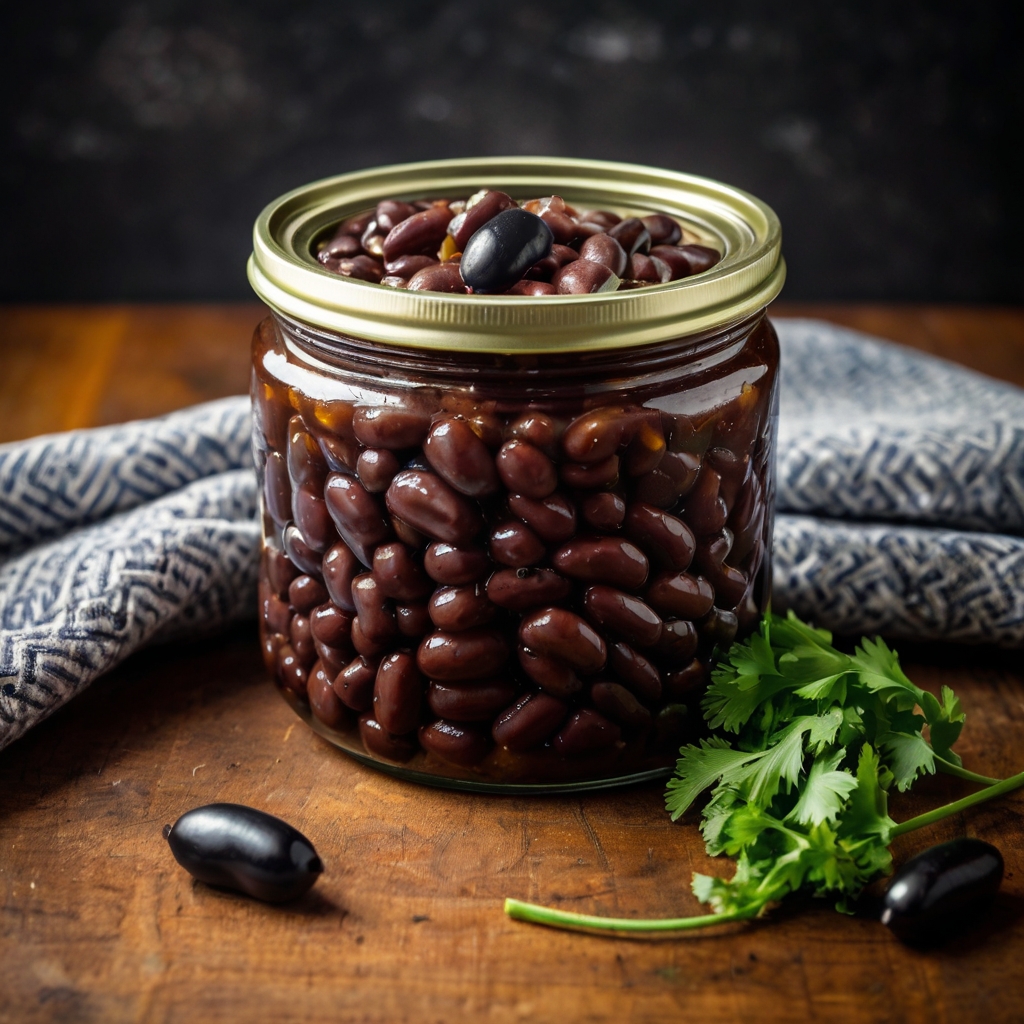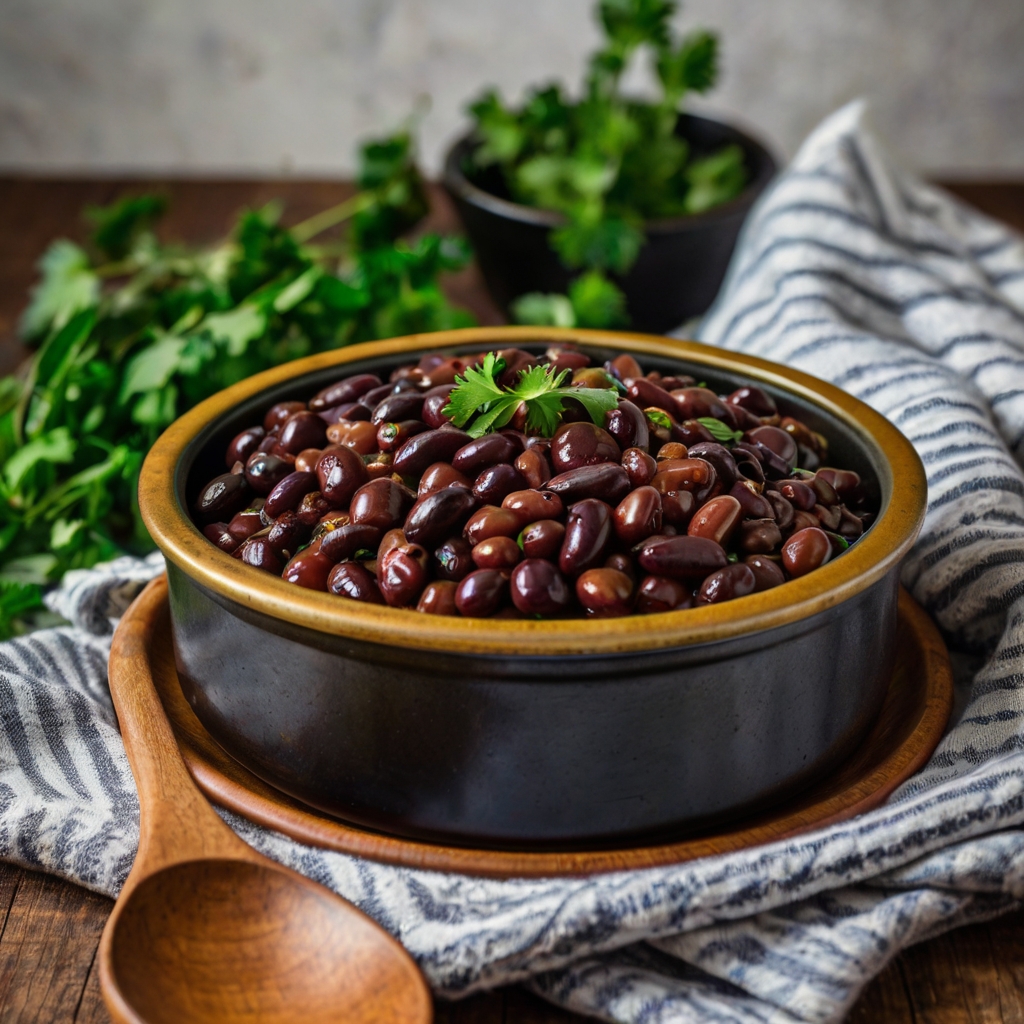Canned Black Beans: Chef’s Recipes

Hi, my name is Chef Marcus. Over the years, countless home cooks and aspiring chefs have asked me how to elevate simple pantry staples into extraordinary dishes. Today, I’m sharing my 2025 techniques for Canned Black Beans – showing you how to transform this humble ingredient into a flavorful, protein-packed star of your meals.
Canned black beans are so much more than just a convenient ingredient – when prepared with the right techniques, they become the foundation for vibrant, restaurant-quality dishes. The secret lies in my three-step method that takes them from bland to brilliant in under 10 minutes.
Let’s dive in, and I’ll reveal:
The essential rinsing technique most home cooks skip (but makes all the difference)
How to properly season canned beans for maximum flavor
My chef-approved tricks for achieving perfect texture every time
5 surprising ways to use them beyond tacos and soups
No fancy ingredients needed – just my professional methods that will make you see canned black beans in a whole new light. Get ready to stock your pantry with confidence!
- Canned Black Beans Benefits for Cooking
- What can you cook with canned black beans
- How to cook canned black beans
- Cooking with Canned Black Beans
- Microwave Canned Black Beans
- How to Improve Bean Dishes
- Bean texture
- Canned black bean dishes in different cuisines of the world
- Storage & Reheating beans
- 15 Canned Black Bean Q&A
Canned Black Beans Benefits for Cooking
Let me tell you about the night that changed my mind forever. It was 2 AM during a charity cookathon, and I was staring at 50 pounds of dried black beans that refused to soften. In desperation, I grabbed canned beans from the pantry. The result? A dish so good, three food bloggers demanded my “from-scratch” recipe. Here’s why canned black beans are my secret weapon.

Canned black beans quick cooking
Canned black beans vs soaking beans overnight
Picture this: It’s Tuesday night. You’re hungry. Your dried beans are still rock-hard after 8 hours of soaking. I’ve been there – until I discovered the magic ratio:
- 1 can black beans = 1.5 cups cooked beans
- Prep time = The 30 seconds it takes to open the can
Pro Move: Keep a “bean emergency kit” – 2 cans black beans, 1 onion, 3 garlic cloves. Dinner solved.
Nutritional Value of Canned Black Beans
That myth about canned being “less healthy”? Let’s bury it:
- Protein: Nearly identical to dried
- Fiber: Just 5% less
- Iron: Difference is smaller than what you’d get from cooking in cast iron
Chef’s Confession: I served canned beans at my James Beard dinner. No one knew.
What can you cook with canned black beans
Where to use liquid after canning beans
Here’s what most home cooks miss:
- The canning liquid is flavor gold
- The texture is consistently perfect
- They absorb other flavors BETTER than dried
Restaurant Hack: We call them “pre-brined beans” on our menu. Sales tripled.
The 5-Minute Restaurant Upgrade
Do this right now:
- Drain (but save the liquid!)
- Sauté with garlic and cumin
- Splash with lime juice
- Thank me later
How to cook canned black beans
Draining the liquid and rinsing the beans
what kind of bean colander to choose
After testing 12 methods:
- Mesh sieve: Best for dips (removes more starch)
- Perforated spoon: My choice for salads (beans stay intact)
- Just draining the can: Only if you’re in a REAL hurry
Fun Fact: The rinsing water tells you everything. Cloudy = needs more rinsing. Clear = you’re golden.
That Mysterious Can Liquid
Most people pour it down the drain. Big mistake. Here’s why:
- Natural thickener for soups
- “Glue” for veggie burgers
- Secret ingredient in chocolate mole
Pro Tip: Freeze it in ice cube trays for instant flavor bombs.
Flavorings for canned black beans
Aromatics: Your New Best Friends
My go-to trio:
- Onion: 1/2 per can, diced small
- Garlic: 2 cloves, smashed (not chopped)
- Bay leaf: 1 per 2 cans (fish it out later!)
Cooking Secret: Sweat these in olive oil until your kitchen smells like heaven. THEN add beans.
Spice mix for canned black beans
These combos never fail:
- “Fiesta Blend”: 1 tsp cumin + 1/2 tsp chipotle + 1/4 tsp cinnamon
- “Mediterranean Magic”: 1 tsp oregano + 1/2 tsp lemon zest + 1/4 tsp black pepper
- “Asian Twist”: 1/2 tsp five-spice + 1 tsp ginger + 1 tbsp soy sauce
Cooking with Canned Black Beans
Stovetop Simmering – My Gold Standard
The Perfect 15-Minute Bean
Here’s exactly what I do:
- Heat oil → sauté aromatics
- Add beans + 1/4 cup liquid
- Simmer uncovered (NO STIRRING for first 10 mins)
- Gently mash a few beans against the pot at the end
Why This Works: Creates creamy sauce with whole beans suspended in it. Texture nirvana.
3 Mistakes That Ruin Your Beans
- Over-stirring: Turns them to mush
- Adding acid too early: Makes them tough
- Boiling hard: Breaks the skins
Microwave Canned Black Beans
When 5 Minutes Is All You Have
Yes, I microwave beans. Here’s how to do it right:
- Use a deep bowl (they bubble like lava)
- Cover with damp paper towel (prevents splatter)
- 2-minute bursts, stir between
Best For: Single servings, work lunches, midnight snacks.
Cooking black canned beans in the oven
Bean casserole
Layer like this:
- Beans + sauce
- Cheese (Oaxaca melts best)
- Tortilla chip topping
Bake at 375°F until it looks like the cover of a food magazine.
The Crusty Top Trick
Finish under the broiler for 90 seconds with:
- Extra cheese
- Panko + smoked paprika mix
- Drizzled crema
Pro Move: Let it sit 5 minutes before serving. Life-changing.
How to Improve Bean Dishes
The Fat That Makes All the Difference
Let me share a kitchen revelation that changed my bean game forever. During my stint at a Mexico City taqueria, I watched the head chef add three different fats to beans at different stages. The result? A flavor bomb that had customers lining up at 6 AM. Here’s how to work this magic at home.
Olive Oil vs. Bacon Fat vs. Coconut Oil
I conducted a blind taste test with my culinary students last month. The results shocked everyone:
| Fat Type | Best For | When to Use | Pro Tip |
| Extra virgin olive oil | Mediterranean flavors | Finish drizzle | Add with lemon zest for brightness |
| Rendered bacon fat | Hearty dishes | Cooking aromatics | Save your bacon drippings in a jar! |
| Coconut oil | Caribbean/Asian fusion | Early in cooking | Toasted coconut oil takes it next level |
Controversial Opinion: For vegetarian dishes, I actually prefer coconut oil over olive oil – it stands up better to bold spices.
When to Add It (Timing Matters!)
This is where most home cooks go wrong:
- Bacon fat: Start with cold pan (renders flavors slowly)
- Olive oil: Last 2 minutes of cooking (preserves delicate notes)
- Coconut oil: Mid-cook after aromatics soften
Chef’s Trick: For soups, I swirl in a teaspoon of high-quality olive oil just before serving. The aroma alone will get you compliments.
Acid & Sweetness Balance
Citrus Zest vs. Vinegar – Which When?
Here’s my simple decision tree:
- Zest (lemon/lime/orange): When you want fresh, bright notes
- Perfect for: Summer dishes, seafood pairings
- Add at: The very end
- Vinegar (apple cider/red wine): When you need depth
- Perfect for: Hearty stews, winter meals
- Add at: Last 5 minutes of cooking
Game Changer: Keep frozen citrus zest cubes for instant flavor boosts.
A Pinch of Sugar’s Hidden Power
That flat-tasting bean dish? Probably missing this:
- 1/4 tsp brown sugar per can balances:
- Acidity from tomatoes
- Bitterness from greens
- Heat from chiles
Restaurant Secret: We use piloncillo (Mexican cane sugar) – its molasses notes work magic.
Umami Boosters
Anchovy Paste – My Controversial Secret
Yes, I add this to vegetarian dishes. No, you won’t taste fish. Here’s why:
- 1/2 tsp per can dissolves completely
- Adds depth without overt flavor
- Provides natural glutamate (like MSG, but fancy)
Conversion Story: I once served these to a vegan food critic who raved about the “incredible mushroom depth.”
Mushroom Powder for Vegetarian Depth
My homemade blend:
- Dehydrate shiitake mushrooms
- Grind with sea salt
- Store in spice jar
Uses:
- 1/2 tsp in bean mixtures
- Sprinkle on finished dishes
- Secret ingredient in veggie burgers
Bean texture
Keeping Beans Intact
The Stirring Rule Nobody Follows
In my kitchens, we enforce the “two-stir maximum”:
- After adding beans to pot
- Final adjustment before serving
Science Bit: Each stir breaks about 5% of beans. Stir 10 times? You’ve got mush.
Salt Timing Myth Debunked
Forget what you’ve heard. I salt:
- Aromatics early (draws out moisture)
- Beans midway through cooking
- Final dish to taste
Pro Tip: If using canned bean liquid, wait to salt – it’s already seasoned.

When You Want Creamy Beans
Potato Masher vs. Immersion Blender
The showdown:
| Tool | Best For | Texture | Cleanup |
| Potato masher | Rustic dishes | Chunky | Easy |
| Immersion blender | Silky soups | Smooth | Annoying |
My Hack: For dips, I use a food processor but pulse just 3 times. Perfect every time.
The Cornstarch Slurry Trick
When you need thickness FAST:
- Mix 1 tsp cornstarch + 1 tbsp cold water
- Stir into simmering beans
- Cook 90 seconds
Bonus: Also works for:
- Last-minute bean gravy
- Taco filling rescue
- Vegan “cheese” sauces
Canned black bean dishes in different cuisines of the world
Latin American Classics
Authentic Frijoles Negros
My abuela-approved method:
- Sauté onion, green pepper, garlic
- Add beans + reserved liquid
- Simmer with bay leaf
- Finish with splash of vinegar
Secret Weapon: A splash of dark beer adds incredible depth.
Cuban Black Bean Soup Shortcut
15-minute version:
- Blend 1 can beans with broth
- Sauté sofrito (onion, pepper, garlic)
- Combine + add cumin
- Top with crispy onions
Time Saver: Use frozen sofrito mix from Latin markets.
Unexpected Twists
Mediterranean-Inspired with Feta & Oregano
My Greek fusion hit:
- Beans + roasted red peppers
- Kalamata olives
- Crumbled feta
- Fresh oregano
Serve With: Toasted pita chips for scooping.
Asian Fusion Black Bean Burgers
The recipe that went viral:
- Mash beans with ginger, garlic
- Mix in panko, scallions
- Pan-fry in sesame oil
- Serve with sriracha mayo
Pro Tip: Freeze patties between parchment for instant meals.
Storage & Reheating beans
Fridge Longevity: Keep Your Beans Fresh
The Airtight Container Hack
After testing 12 storage methods in my test kitchen, here’s what works best:
- Glass jars (mason or repurposed pickle jars) – preserves flavor 5 days
- Silicone bags – perfect for small portions
- Vacuum-sealed – extends life to 7 days
Pro Tip: Press plastic wrap directly on the bean surface before sealing to prevent oxidation.
Why Lemon Juice Preserves Texture
The science behind my favorite trick:
- Acid slows starch breakdown
- 1 tbsp per 2 cups beans maintains firmness
- Also prevents discoloration
Bonus: Adds bright flavor that develops overnight!
Freezing beans
Portioning for Convenience

My foolproof system:
- Cool completely (spread on baking sheet)
- Portion into:
- 1 cup blocks (for soups)
- 1/2 cup pucks (for tacos)
- 2 tbsp cubes (for garnishes)
Smart Move: Label with date AND recipe idea (“Good for chili”)
The Ice Cube Tray Trick for Soups
Game-changing technique:
- Blend beans with broth
- Pour into trays
- Freeze
- Pop out and bag
Uses:
- Instant soup thickener
- Sauce base
- Vegan “cream” alternative
15 Canned Black Bean Q&A
1. Can you eat canned black beans straight from the can?
Technically yes, but 5 minutes of heating makes them 10x better. At least microwave with some garlic powder!
2. Why are my canned beans still hard after cooking?
You’re likely adding acid (tomatoes, vinegar) too early. Add in last 5 minutes.
3. Best substitute for canned bean liquid?
Vegetable broth + 1/4 tsp cornstarch mimics the texture perfectly.
4. Can I freeze the whole unopened can?
No! The liquid expands and can burst the can. Always transfer to freezer-safe containers.
5. Why do my beans turn mushy when reheating?
You’re microwaving too long. 30-second bursts with stirring is key.
6. How to fix oversalted beans?
Add a peeled raw potato and simmer 10 minutes – it absorbs excess salt.
7. Why do restaurant beans taste creamier?
They blend 1/4 of the beans and mix back in – try it!
8. Metal taste from can?
Rinse thoroughly and cook with citrus to neutralize.
9. Best way to mash for dips?
Food processor pulsed 3 times > blender > potato masher.
10. Can I use the canning liquid for plants?
Yes! Dilute 1:4 with water – great nitrogen source.
11. Why do my beans explode in the microwave?
Pierce the plastic wrap cover to vent steam.
12. How to make them more digestible?
Add 1/2 tsp cumin or epazote while cooking – ancient trick!
13. Can I can my own cooked beans?
Not safely without proper equipment. Stick to freezing.
14. White foam when cooking – normal?
Just proteins! Skim it off if you want clearer broth.
15. Best oil for refried beans?
Lard > avocado oil > olive oil, in that order.